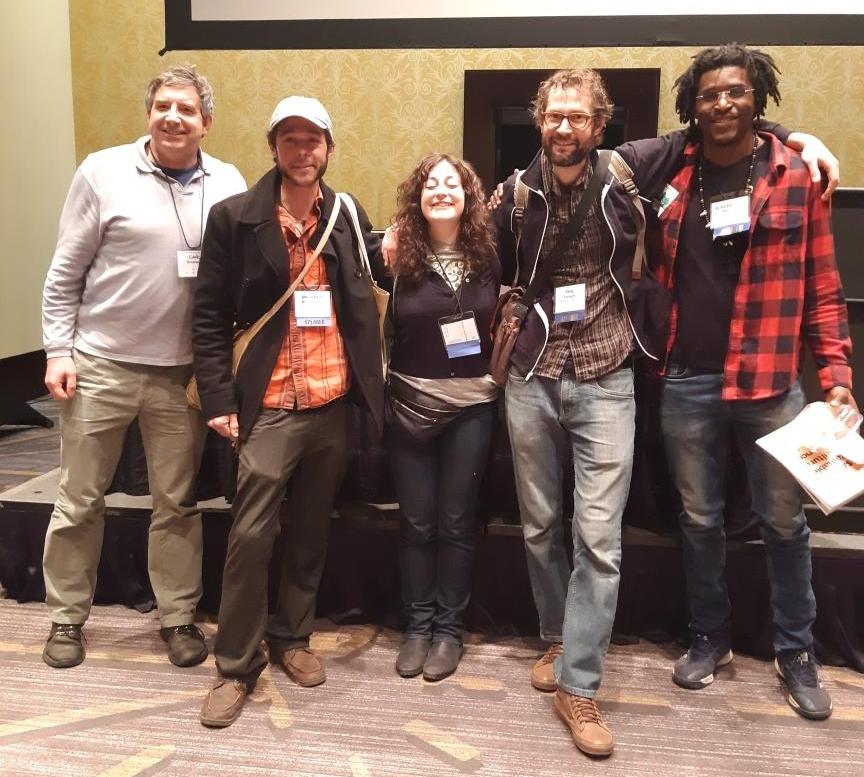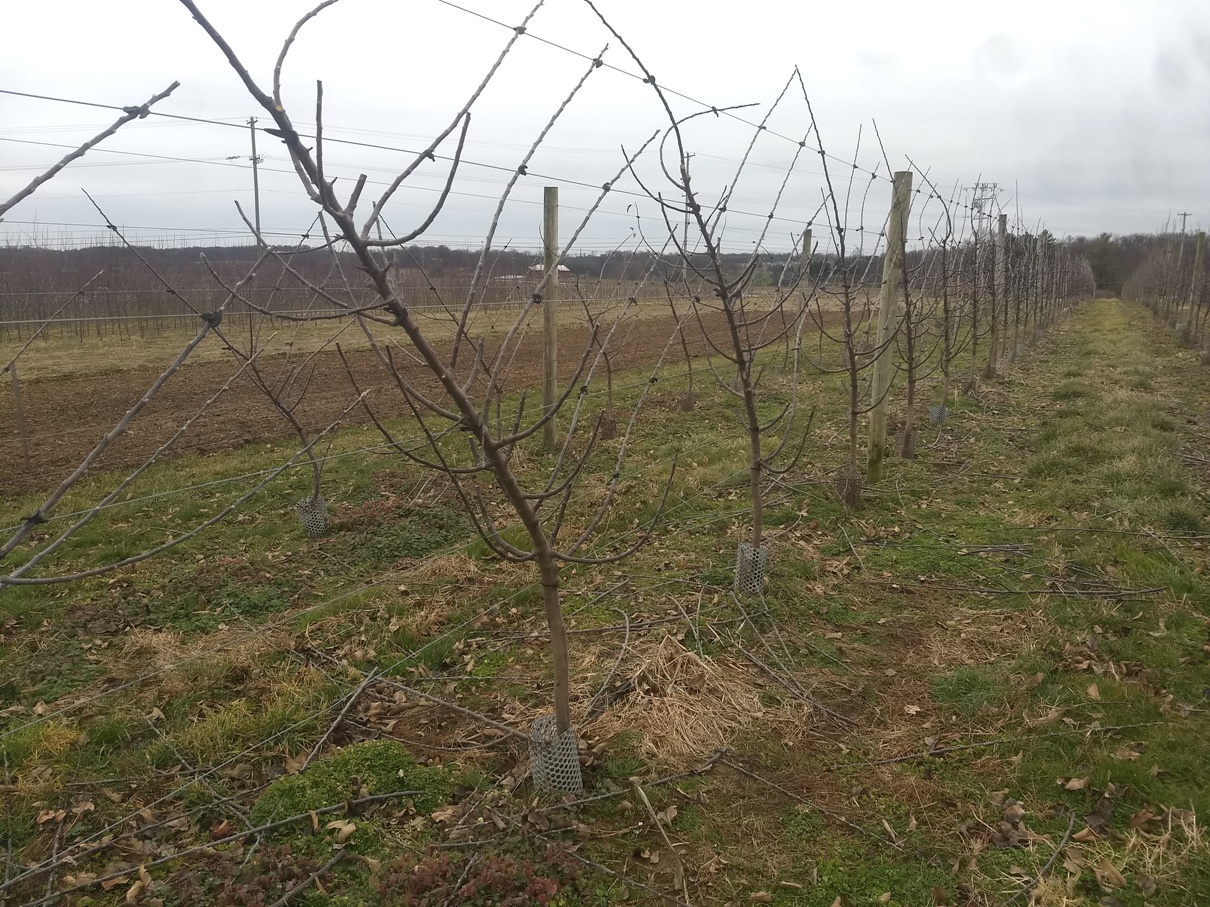POP program staff Alkebu-Lan Marcus, Alyssa Schimmel, Michael Muehlbauer, and Phil Forsyth attended the 29th annual Pennsylvania Sustainable Agriculture Association (PASA) Farming for the Future Conference in Lancaster, PA in February 2020. Each winter since 1992, farmers, food system professionals, educators, advocates, homesteaders, and others who are passionate about building a better food system have gathered at the PASA conference for four days of intensive learning on 100+ food and farming topics. POP staff led a workshop on the successes and challenges of urban community orchards and attended trainings on biological orcharding, greenhouse planning, ecological design, hazelnut and chestnut growing, soil and tree biology, and more. As always, the conference was a lovely time to build community through many conversations and meals shared with inspiring food system folks from near and far!

In POP’s session on Successes & Challenges of Urban Orchards, the POP team shared key learnings from the past 13 years of planting and supporting community orchards, with case history examples from 3 sites: Overbrook School for the Blind, Mill Creek Urban Farm, and Fair-Amount Food Forest, and then followed with break-out brainstorm sessions for attendees to think through assets and challenges in their own community examples.
POP Co-Director Phil Forsyth provided context for the history of the organization, its programs and approach to partnerships, reasons why food forest orchards are beneficial in the city (food access, health, habitat, community gathering places, educational opportunities, micro-enterprise, carbon sequestration and shade for neighborhood cooling), and some of the challenges (high turnover of orchard partner staff, land access and development pressure, ongoing pest & disease management, etc).
POP Education Director Alyssa Schimmel discussed site Overbrook School for the Blind, one of the largest of the 13 school orchards POP supports as a key model for accessibility and cross-organizational partnerships, that includes a wheelchair accessible greenhouse, 30+ fruit trees, brambles, and raised garden beds for asparagus and strawberries. A few strengths from that site including how through the school’s Farm-to-Table Program and the outgrowth of the cross-organizational GrowAbility collective, many members of the staff and other organization are involved with visions of how the landscapes are used for classroom programming around nutrition, food use, and sensory education. Collectively, they are working to build curriculum that is relevant for special needs students at this site and throughout other Philadelphia schools.
POP Orchard Director Alkebu-Lan Marcus talked about his involvement with Mill Creek Farm as former head farmer, which grew out of his Black Lives Matter activism after the murder of Freddie Gray. As a vegetable farm serving the surrounding neighborhoods, with fruit trees, bee hives, cob oven, and more, Alkebu-Lan talked about ways of engaging community through capturing the imagination about the unique fruits and vegetables that could be planted — for example, creating an entryway tunnel under the yellow plum tree where children could pick fruit and take naps under the shade of the trees.
Wrapping up the case histories and providing context for the breakout activity to follow, POP Orchard Director Michael Muehlbauer talked about the in-development Fair Amount Food Forest project that aims to build a public food forest on city land, which he and other members of a grassroots coalition have been working on for the past four years. Bringing his experience as a former core member of the Beacon Food Forest in Seattle, Michael shared more about the project’s process including multi-year efforts of neighborhood activities, outreach, and a community design process; working with city government; the development and importance of partnerships; acquisition of initial funding and insurance; and preparations for planting. As a new project that has been grassroots, neighborhood focused and is set to be planted at current POP partner site, historic Woodford Mansion, the presentation provided inspiration and process detail for groups starting their own community organizing and planning efforts.
Following the case studies, POP staff led a group exercise where the 50 or so workshop attendees divided into smaller groups to help define next steps and anticipated challenges for their efforts to establish community orchards in their own neighborhoods.
Highlights of Other PASA Sessions
POP Orchard Directors Michael Muehlbauer and Alkebu-Lan Marcus attended a great full-day track on Biological Orcharding led by Michael Phillips at North Star Orchard in Cochranville, PA. The lecture focused on building soil and plant health through nurturing symbiotic relationships between plants and fungi via mulching and composting systems which supply micro-nutrients and through the application of beneficial microbes to combat pathogenic ones. Philips expanded to explain why higher Carbon:Nitrogen ratios benefit fruit trees with methods like hugelkultur and the use of ramial wood chips, essentially mimicking a woodland edge ecosystem to get desired effects and providing our trees/orchards/farms with plant allies, biological sprays, and other aids that help fruit trees defend themselves. The timing of pest and disease management was stressed as paramount, in order to be effective when using biological or organic methods.

The Biological Orcharding session was held at North Star Orchard, which is a 20 acre orchard that grows apples, Asian pears, peaches, pears, plums and vegetables in a manner they call “Certified Sensible“, but not certified organic. The tour of North Star Farm was very impressive and highlighted their independent apple breeding program and a very interesting french espalier trellis system. Apple varieties recommended by farm owner Ike for organic production include: Liberty, Priscilla, Enterprise, Arkansas Mammoth Black, Jonalicious, Prairie Spry, Releika and Brushy Mountain Limbertwig.
POP Education Director Alyssa Schimmel and Co-Director Phil Forsyth attended an impassioned, informative, and inspiring talk by Akiva Silver of Twisted Tree Farm on Bread & Butter Nut Trees for our region. Silver traced the history of the region’s forest ecology, which had predominantly consisted of American chestnuts, before the vast swath of trees (nearly in its entirety!) were taken out by blight fungus in the early 1900s. Silver described how this history, along with nut trees incomparable advantage acre-to-acre of producing higher protein nuts and oils compared to current monoculture field crops like canola and soy, have compelled him to devote his life to the breeding of resilient and delicious nut trees, which he teaches about and provides through his nursery.
Because chestnuts are wind pollinated, he described his work to cross many species of American and Asian chestnuts, caring less about documenting the species involved, and more about the hardiness of the traits carried through each cross. He also covered hazelnuts, encouraging folks to simply harvest the nuts while the casings are still green (in response to the commonly asked question about getting them before the squirrels); and bitternut hickory, which despite being a hard nut to crack, can produce a delicious oil (whose tannins do not leach into the oil when pressed!) and an excellent hickory nut milk (shells included!) made by pounding the nuts with a long stick in a large mortar – pestle style contraption which comes from indigenous traditions for making use of these valuable nut crops.
This edition of POP TIPS written by POP staff Alkebu-Lan Marcus, Alyssa Schimmel, Michael Muehlbauer, and Phil Forsyth.
SUPPORT US! If you found this entry useful, informative, or inspiring, please consider a donation of any size to help POP in planting and supporting community orchards in Philadelphia: phillyorchards.org/donate.